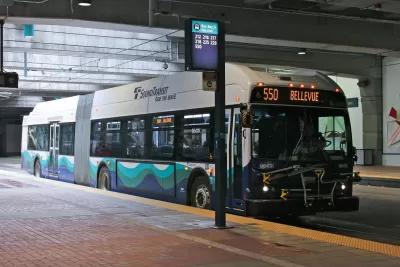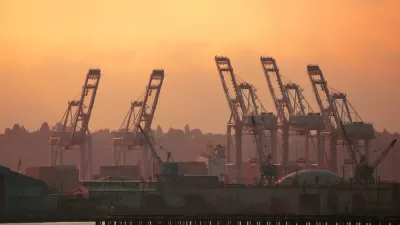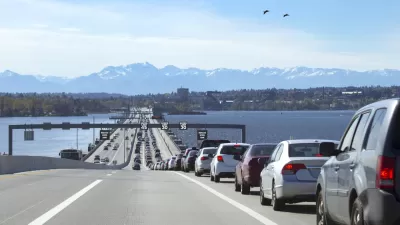The 2017 survey shows that most people drive, but income and housing location also affect people’s options and choices.

Stephen Fesler reports on the Puget Sound Regional Council’s release of its 2017 household travel survey data. The survey gathered information on travel behavior, parking and transit costs, and the factors related to mode choice.
It finds that most people, over 80 percent, have free parking at work, and high-income workers have more access to subsidized transit passes. “Larger employers–which tend to be higher paying–are required to create a [Commute Trip Reduction] program for employees. These programs often include subsidized or free transit passes. However, that often leaves lower-income individuals without cheaper transit options unless they qualify for ORCA LIFT, a reduced fare program that King County launched in 2015,” writes Fesler. In addition, the majority of transit users are reaching transit on foot.
Most people across all income levels drive, but lower-income households are more likely to walk or use transit, the survey shows. Fesler describes the mode choice differences by race:
Asians had the highest drive-alone and biking rates while reporting lower shared driving trips. Black, Latino, and other multiracial households reported double the transit rate, substantially lower drive-alone rates, and higher shared driving trips. Caucasian households had the lowest transit use rates, but otherwise were middle of the pack for other modes.
The survey also examines the ways in which housing affects mode choice. People living in Seattle’s regional growth centers—higher density, mixed-use areas—are more likely to walk or use transit and less likely to drive than people living in centers outside of Seattle or those not living in centers.
In addition, most of the lower-income respondents report that living in a walkable area near activities is important to them. “This was increasingly less important to middle-income and higher-income households. It seems very likely that this is related to regular access to a car, which very low-income households generally lack,” notes Fesler. A similar income pattern emerged in terms of the importance of close transit, with a majority of low-income respondents indicating this was important.
FULL STORY: PSRC’s 2017 Travel Survey Shows Transit Is Popular, Free Parking Induces Driving

Maui's Vacation Rental Debate Turns Ugly
Verbal attacks, misinformation campaigns and fistfights plague a high-stakes debate to convert thousands of vacation rentals into long-term housing.

Planetizen Federal Action Tracker
A weekly monitor of how Trump’s orders and actions are impacting planners and planning in America.

San Francisco Suspends Traffic Calming Amidst Record Deaths
Citing “a challenging fiscal landscape,” the city will cease the program on the heels of 42 traffic deaths, including 24 pedestrians.

Defunct Pittsburgh Power Plant to Become Residential Tower
A decommissioned steam heat plant will be redeveloped into almost 100 affordable housing units.

Trump Prompts Restructuring of Transportation Research Board in “Unprecedented Overreach”
The TRB has eliminated more than half of its committees including those focused on climate, equity, and cities.

Amtrak Rolls Out New Orleans to Alabama “Mardi Gras” Train
The new service will operate morning and evening departures between Mobile and New Orleans.
Urban Design for Planners 1: Software Tools
This six-course series explores essential urban design concepts using open source software and equips planners with the tools they need to participate fully in the urban design process.
Planning for Universal Design
Learn the tools for implementing Universal Design in planning regulations.
Heyer Gruel & Associates PA
JM Goldson LLC
Custer County Colorado
City of Camden Redevelopment Agency
City of Astoria
Transportation Research & Education Center (TREC) at Portland State University
Jefferson Parish Government
Camden Redevelopment Agency
City of Claremont




























